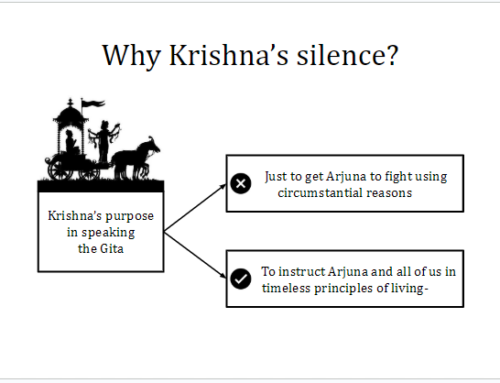To be shortsighted is bad: Suppose a person develops symptoms indicative of infection by a pandemic. If they neglect those symptoms, they may unwittingly infect many other people.
To be shortsighted when we have the responsibility to be farsighted is worse: Suppose a doctor overlooks those symptoms in a patient. Why? Because the doctor isn’t attentive enough. That would be terrible.
To be shortsighted when we have the ability to be farsighted is the worst: Suppose the doctor knows the patient is infected by a pandemic, but deliberately doesn’t alert the patient. Why? Because they hate the community to which the patient belongs and want that entire community to get infected. That would be horrible, unconscionable.
We are often shortsighted: We act impulsively, seeking immediate gratification without considering long-term consequences. By such indiscriminate indulgence, many people get addicted. The Bhagavad-gita cautions that impulsive drives such as lust, anger and greed make life hellish (16.21).
We have a responsibility to be farsighted, yet we aren’t: Unlike other living beings, we humans have intelligence developed enough to perceive the consequences of sensual indulgence. Unfortunately, we are so captivated by worldly pleasures that we seek it with intelligently developed technologies. Such is the intelligence that furthers ignorance (18.32).
We have the ability to be farsighted, yet we aren’t: Some people have access to wisdom-texts like the Gita that explain life’s ultimate meaning and purpose. Yet they misinterpret those texts and deliberately promote sensuality so that people stay attached and manipulable. Such misleaders are humanity’s greatest enemies.
Thankfully, if we study the Gita with those who seek to live the Gita, we can protect ourselves from all forms of shortsightedness.
One-sentence summary:
To be shortsighted is bad; to be shortsighted when we have the responsibility to be farsighted is worse; to be shortsighted when we have the ability to be farsighted is the worst.
Think it over:
- How do we tend to be shortsighted?
- How do we neglect the responsibility to be farsighted?
- How do we neglect the ability to be farsighted?
***
16.21: There are three gates leading to this hell – lust, anger and greed. Every sane man should give these up, for they lead to the degradation of the soul.
To know more about this verse, please click on the image
Explanation of article:
Podcast:



Hare Krishna, mindblowing comparison between Gita and Pandemic.Thank you.
Happy to be of service.
Thank you Prabhu for being so kind in sharing your exquisite knowledge in such an easy to follow format. It helps me to understand the real truth in/of life and to start loving it.
Hare Krishna
Dear Jolie, Thanks for your kind comment – delighted to know that Gita-daily is helping you in your spiritual journey.
Harekrishna. Wonderful Prabhu ji. Like the gradation of shortsightedness. 1. bad – shortsightedness 2. Worse – shortsightedness while neglecting your responsibility to be farsightedness. 2. Worst – shortsightedness when we are able to be farsightedness. Just amazing. Harekrishna.
Happy to be of service.